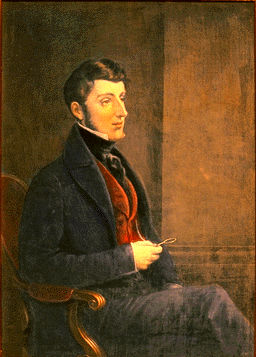Browse "Lower Canada"
-
Article
Act of Union (Plain-Language Summary)
The Act of Union was passed by the British Parliament in July 1840. It became law on 10 February 1841. It merged Canada West (formerly Upper Canada) and Canada East (formerly Lower Canada) into the Province of Canada (1841–67). The Act was based on the findings of the Durham Report. It was presented by Lord Durham in 1839. The Act sought to assimilate French Canadians, limit the power of the Family Compact and promote economic growth. This article is a plain-language summary of the Act of Union. If you would like to read about this topic in more depth, please see our full-length entry: Act of Union.
"https://d2ttikhf7xbzbs.cloudfront.net/media/media/1bddc49a-9bfc-45cf-9e3e-1a42362ed5d4.jpg" // resources/views/front/categories/view.blade.php
https://d2ttikhf7xbzbs.cloudfront.net/media/media/1bddc49a-9bfc-45cf-9e3e-1a42362ed5d4.jpg
-
Article
Château Clique
Château Clique, nickname given to the small group of officials, usually members of the anglophone merchant community, including John MOLSON and James MCGILL, who dominated the executive and legislative councils, the judiciary and senior bureaucratic positions of LOWER CANADA until the 1830s.
"https://d2ttikhf7xbzbs.cloudfront.net/media/media/ae171a3d-7542-4745-8013-b08068bf08e5.jpg" // resources/views/front/categories/view.blade.php
https://d2ttikhf7xbzbs.cloudfront.net/media/media/ae171a3d-7542-4745-8013-b08068bf08e5.jpg
-
Article
Clergy Reserves
Clergy Reserves, one-seventh of the public lands of Upper and Lower Canada, reserved by the 1791 Constitutional Act for the maintenance of a "Protestant clergy," a phrase intended to apply to the Church of England alone.
"https://d2ttikhf7xbzbs.cloudfront.net/media/media/693e886b-aefa-4d54-b3e0-c1695d334bb0.jpg" // resources/views/front/categories/view.blade.php
https://d2ttikhf7xbzbs.cloudfront.net/media/media/693e886b-aefa-4d54-b3e0-c1695d334bb0.jpg
-
Article
Durham Report (Plain-Language Summary)
In late 1837, violent rebellions took place in Upper and Lower Canada. (See Rebellions of 1837–38 [Plain-Language Summary].) In May 1838, Lord Durham was sent from Britain to find out what had caused the unrest. His Report on the Affairs of British North America (1839) led to a series of reforms. These included merging the two Canadas into the Province of Canada. This was done through the Act of Union in 1841. The report also paved the way for responsible government. This was a vital step in Canada’s path toward democracy and independence from Britain. This article is a plain-language summary of the Durham Report. If you would like to read about this topic in more depth, please see our full-length entry: Durham Report.
"https://d2ttikhf7xbzbs.cloudfront.net/media/media/65ee2cc4-fcf5-4663-b8d2-f9ce30422a92.jpg" // resources/views/front/categories/view.blade.php
https://d2ttikhf7xbzbs.cloudfront.net/media/media/65ee2cc4-fcf5-4663-b8d2-f9ce30422a92.jpg
-
Article
Lower Canada
Lower Canada was a British colony from 1791 to 1840. Its geographical boundaries comprised the southern portion of present-day Quebec. In 1791, Britain divided the Province of Quebec into Upper Canada and Lower Canada. (See: Constitutional Act 1791.) Britain had followed a similar policy of territorial division twice before. Prince Edward Island was detached from Nova Scotia in 1769. The provinces of Cape Breton and New Brunswick were created in 1784 in response to the wave of Loyalist immigration (which also occurred in Quebec). In 1841, Upper Canada and Lower Canada were renamed Canada West and Canada East, respectively. They were united as the single colony of the Province of Canada.
"https://d2ttikhf7xbzbs.cloudfront.net/media/media/0a40188b-4ef4-4e9e-90bb-ec21d39c1c45.jpg" // resources/views/front/categories/view.blade.php
https://d2ttikhf7xbzbs.cloudfront.net/media/media/0a40188b-4ef4-4e9e-90bb-ec21d39c1c45.jpg
-
Article
Rebellion in Lower Canada (The Patriots' War)
In 1837 and 1838, French Canadian militants in Lower Canada took up arms against the British Crown in a pair of insurrections. The twin rebellions killed more than 300 people. They followed years of tensions between the colony’s anglophone minority and the growing, nationalistic aspirations of its francophone majority. The rebels failed in their campaign against British rule. However, their revolt led to political reform, including the unified Province of Canada and the introduction of responsible government. The rebellion in Lower Canada, which is also known as the Patriots' War (la Guerre des patriotes), also gave French Canadians one of their first nationalist heroes in Louis-Joseph Papineau.
"https://d2ttikhf7xbzbs.cloudfront.net/media/media/37aadc48-3f88-4946-a9aa-0d2ad30495cd.jpg" // resources/views/front/categories/view.blade.php
https://d2ttikhf7xbzbs.cloudfront.net/media/media/37aadc48-3f88-4946-a9aa-0d2ad30495cd.jpg
-
Article
Royal Proclamation of 1763 (Plain-Language Summary)
The Royal Proclamation of 1763 was issued after the British defeated the French at Québec City in 1759 and Montreal in 1760 (see Battle of the Plains of Abraham and Seven Years’ War). After those defeats, New France (1608-1763) was taken over by the British. The Proclamation brought the new Province of Quebec under British control.
"https://development.thecanadianencyclopedia.ca/images/tce_placeholder.jpg?v=e9dca980c9bdb3aa11e832e7ea94f5d9" // resources/views/front/categories/view.blade.php
https://development.thecanadianencyclopedia.ca/images/tce_placeholder.jpg?v=e9dca980c9bdb3aa11e832e7ea94f5d9
-
Article
Special Council of Lower Canada (1838–1841)
Between 1838 and 1841, Lower Canada was governed by an “authoritarian” political body known as the Special Council.
"https://d2ttikhf7xbzbs.cloudfront.net/media/media/9b102db4-f93d-44c3-a26e-d61b3ea11b50.jpg" // resources/views/front/categories/view.blade.php
https://d2ttikhf7xbzbs.cloudfront.net/media/media/9b102db4-f93d-44c3-a26e-d61b3ea11b50.jpg
